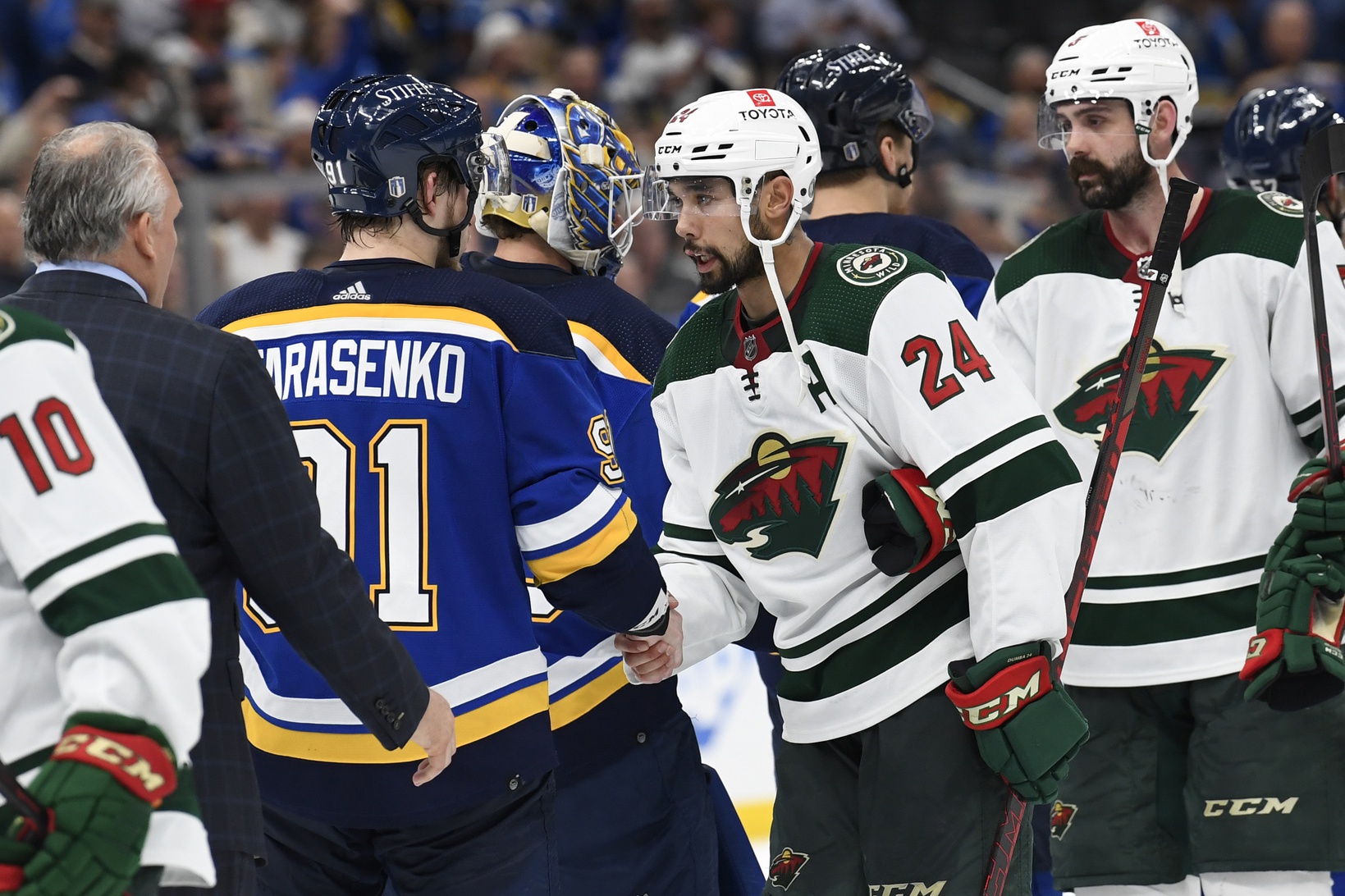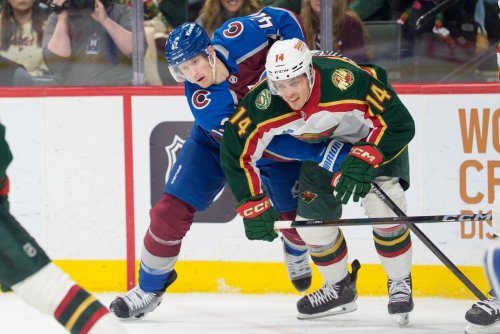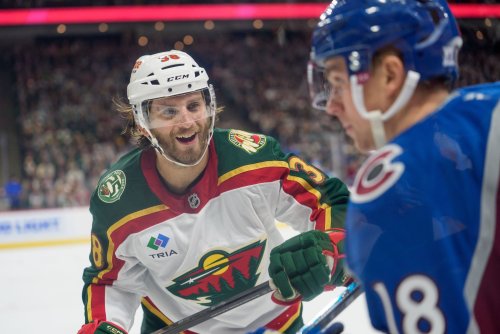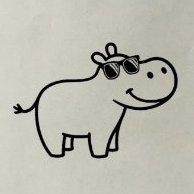
Different year on the calendar, different roster, same outcome.
All year long, it felt like this Minnesota Wild club was different than years past. But the result was the same: a first-round exit, this time to the St. Louis Blues in six games. That's now six straight first-round losses in their past six postseason appearances. And it's arguably the most disappointing first-round loss in recent history for a few reasons, forever tainting the Wild's historic season.
This season, the Wild broke team and individual records, including Kirill Kaprizov (108 points) and Kevin Fiala (85 points) having the first- and second-highest single-season scoring in franchise history, respectively. The Wild looked like a dangerous team throughout most of the regular season, perhaps even a Stanley Cup contender at times.
The organization signaled its confidence about the roster at the trade deadline. It felt like the brass thought this team was capable of making a deep run, considering how patient and honest Bill Guerin has been since he took over.
Minnesota added Future Hall of Fame goaltender Marc-Andre Fleury, who was one year removed from winning the Vezina Trophy, to shore up any doubt in the crease. Furthermore, they added a shutdown defender in Jake Middleton and a physical presence in Nic Deslauriers. Guerin added Middleton and Deslauriers to try and add more sandpaper and depth to the lineup. While the deadline deals weren't necessarily a mistake, they didn't help the Wild reach the next level.
More disappointing was that the Wild were clearly the better team at 5-on-5 during the series. Minnesota controlled 57 percent of the expected goal share in the series, and they had the edge in the expected goal department in five of the six meetings. The only game the Wild didn't have an advantage in the expected goals department was in their 6-2 win in Game 2. Likewise, they allowed just 2.11 expected goals against per 60 in the six meetings, which was the second-best rate in the first round, with the Colorado Avalanche finishing first. And Minnesota only allowed 36 high-danger chances against the Blues, second to the Avalanche's 33.
To make matters worse, the Wild didn't take advantage of the Blues' depleted blue line, with both Torey Krug and Nick Leddy missing significant time during the series.
In the end, none of it mattered. The Wild added another first-round exit to add to the history book.
Heading into the playoffs, Minnesota was presumably the favorite in the series against St. Louis. According to Dom Luszczyszyn's model at The Athletic, the Wild had a 75 percent probability of winning the series.
Why?
The Wild supposedly were deep offensively. They had one of the best defensive cores in the league and a 1-2 punch in goal. While the Blues had a lethal offense featuring nine 20-goal scorers, their defense and goaltending were suspect.
However, there were several different reasons that the Blues exposed the Wild in the playoffs and forced another early exit.
It starts with Dean Evason and the coaching staff, who refused to make adjustments until it was too late. Evason kept Fleury in net and didn't make lineup changes until the season was on the line in Game 6. Conversely, Craig Berube wasn't afraid to make adjustments and get creative in his deployment. Berube turned to Jordan Binnington after Game 2, and they never looked back after that change. Special teams were also a major factor, too. The Wild went 4-for-24 while the Blues had eight goals on 26 opportunities.
Then there's the portion of the team that didn't show up in the playoffs. While the Wild's top nine all controlled play at 5-on-5, most of them didn't produce when it mattered. Kirill Kaprizov finished with seven goals and had the team on his back. But he was virtually the only player on the roster with a playoff mindset. Other than Kaprizov and Joel Eriksson Ek, who had three goals and five points, nobody else was scoring. The GREEF line was unsurprisingly the Wild's best line, and the trio held their own against the Blues.
But neither Ryan Hartman nor Kevin Fiala scored in the series, which was a huge reason behind the Wild's early exit. The Wild depended on both of them for scoring during the regular season. So there was no way they would win this series with zero production from two of their top players.
Center play was an obvious area of weakness in the series. Unfortunately, that's been a recurring discussion in Minnesota over the past few years. Hartman and Gaudreau, the Wild's top two centers, were underwhelming in the series. And they simply couldn't compete with the likes of Ryan O'Reilly, Robert Thomas, and Brayden Schenn. It's another area that will have to be evaluated this summer. However, adding Marco Rossi will significantly help Minnesota at the center position.
The lack of production from Fiala, especially, has led to a serious debate surrounding his future in Minnesota. It seemed like the Wild would be doomed if they didn't re-sign Fiala. However, he recorded only one point at even strength and had 16 penalty minutes in the series. After a 33-goal, 85-point regular season, it wouldn't be surprising to see Fiala command somewhere in the $7-8 million ballpark on his next contract this summer.
But an invisible series by the 25-year-old game-breaker has left him vulnerable to a trade, especially with how crippling the buyouts are on the Wild's salary cap.
The Wild should consider trading both Fiala and Matt Dumba this summer. It would not only open up cap space to allocate to other areas, but Minnesota would gain more assets with the focus of building for a few years down the road. It would also allow larger roles for prospects, such as Matt Boldy, Adam Beckman, and Calen Addison. Young talent has to be the top priority in Minnesota after displaying they're just not ready yet to compete with the Western Conference juggernauts.
Minnesota was one of the best defensive clubs, and the top-four held their own for most of the series. However, the third pair was problematic. Still, even Middleton and Jonas Brodin were seen making atypical defensive miscues. And because of the Zach Parise/Ryan Suter buyouts, the Wild need inexpensive contracts on the book. Re-signing Jon Merrill and Alex Goligoski is a byproduct of that.
But the problem is, at what cost?
Merrill and Goligoski were terrible on the third pair. Having Merrill signed for another three years makes things more complicated. And extending Goligoski for another season was questionable. Even Dmitry Kulikov, who was excellent during the regular season, was awful in his two playoff appearances. Icing a combination of those three on the third pair next season will be extremely risky.
While goaltending was far from the root of the problem, Fleury was nothing more than average, with a .906 save percentage and 1.56 goals allowed above expected. And Cam Talbot, who got the nod in Game 6, didn’t exactly take advantage of his opportunity, either. The Wild suddenly has a goalie controversy heading into the summer.
The Wild had a golden opportunity to make a deep playoff run after their historic season. But the harsh reality is that their collapse displayed that the roster isn't quite capable of doing damage in the playoffs when it matters. Considering their gloomy salary cap outlook and a few irreversible questionable decisions, the Wild have a difficult offseason on the horizon.
All Data Via Evolving-Hockey, Natural Stat Trick, and Hockey-Reference
Think you could write a story like this? Hockey Wilderness wants you to develop your voice, find an audience, and we'll pay you to do it. Just fill out this form.








Recommended Comments
There are no comments to display.
Join the conversation
You can post now and register later. If you have an account, sign in now to post with your account.
Note: Your post will require moderator approval before it will be visible.